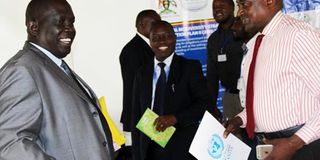UN asks Uganda to mobilise Shs400b for conservation

NEMA Executive Director, Dr Tom Okurut welcoming the UNDP Deputy Country Director, Thomas Ole-Kuyan to the BIOFIN conference at Entebbe on June 13, 2017.
What you need to know:
- National Environment Management Authority (NEMA) Executive Director, Dr Tom Okurut told the meeting that 80 per cent of the population in Uganda directly depends on biodiversity for survival and their lives will be at the peril if conservation isn’t reinforced by closing the financing gap.
- Mr Francis Sabino Ogwal, the NEMA natural resource management officer, said because of the little investment in conservation, there are high levels of deforestation, wetland degradation.
ENTEBBE
Uganda needs to mobilise an extra Shs418 billion to effectively finance the management and conservation of its animal and plant species whose habitats are under threat by economic activities including agriculture and infrastructure developments.
The United Nations Development Programme (UNDP) Country Director Almaz Gebru said Uganda spends approximately Shs91 billion annually on biodiversity conservation which translates to only 17.5 per cent of the financial requirements.
“Therefore, Uganda must mobilise, on average, an extra Shs418 billion every year for biodiversity conservation,” Ms Gebru said in a speech read for her by the UNDP deputy Country Director, Thomas Ole-Kuyan.
This was at the opening of the third Africa Regional Biodiversity Financing (BIOFIN) conference that opened at Entebbe yesterday. The meeting has drawn participants from East, Central and Southern Africa and UN officials.
The country’s biodiversity conservation financing deficits are contained in a study by the National Environment Management Authority (NEMA) conducted with the support of UNDP titled “Biodiversity Expenditure Review and Finance Needs and Gaps Analysis 2017.”
The UNDP official said that it would be selfish of the current generation to hand over to the future generation a planet that is so damaged or devoid of the variety of flora and fauna in the various ecosystems.
Ms Gebru said on-going initiatives such as the UN Programme on Reducing Emissions from Deforestation and Forest Degradation (UN-REDD), Strengthening Climate Information and Early Warning Systems (SCIEWS) project, should create synergies with Biofin initiative since they all aim at conservation.
The UNDP Country Director said nations cannot afford to be oblivious of the economic, scientific, ecological and cultural values of animal and plant species to let them get destroyed or extinct.
“The greater the biodiversity, the greater the resilience of the ecological system. This means, with greater biodiversity, society has better insurance against future adverse occurrences. This should give us impetus to helps nations mobilise resources for conservation,” he said.
UNDP launched the Biodiversity Finance Initiative (BIOFIN) as a new global partnership to address the gap in finance for biodiversity conservation estimated between U$ 130 and 440 billion annually (according to the Convention on Biological Diversity Strategic Plan for 2011-2020).
National Environment Management Authority (NEMA) Executive Director, Dr Tom Okurut told the meeting that 80 per cent of the population in Uganda directly depends on biodiversity for survival and their lives will be at the peril if conservation isn’t reinforced by closing the financing gap.
“Biodiversity Financing brings hope and stability,” Dr Okurut said. He said NEMA is developing a business case for conservation so that the private sector which heavily relies on it for raw materials can be enticed to actively fund financing conservation.
Mr Francis Sabino Ogwal, the NEMA natural resource management officer, said because of the little investment in conservation, there are high levels of deforestation, wetland degradation.
“Ordinary people,” he said may not even see that the authority is doing something to avert these vulnerabilities and threats to the environment.
“We should not wait for a crisis to act. We are giving our findings to government such that government can progressively increase biodiversity financing,” he said in reference to the report in finance gaps launched by Environment state minister Dr Mary Kitutu last week.


